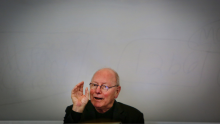Professor Force, icon in maritime law, retires
After teaching thousands of students over 108 semesters – more if you include summer programming – Force, a giant in maritime law whose work has been cited by the U.S. Supreme Court and dozens of lower courts and international ones as well, will retire at the end of the spring semester. His legacy at Tulane is not only the creation of a world-class Maritime Law Center and top-ranked admiralty law program, it also is of training and educating the world’s best lawyers in the field.
In his honor, Tulane Law School held a celebration of his career and contributions to the law school in April, and Force was properly celebrated with a program and a reception that brought dozens of students, alumni, friends, and colleagues.
Professors like Catherine Hancock, a law faculty veteran, spoke of Force’s influence and leadership throughout the years. Professor Martin Davies, to whom Force handed the reins of his creation, the Maritime Law Center, spoke of the impact and influence that Force has had over decades of teaching at Tulane, becoming the foremost expert in maritime law. And interim Law Dean Sally Richardson hailed Force as the best of Tulane Law.
“Professor Force is truly a force of nature,” said Richardson. “He has had world renowned careers in multiple areas, not only in admiralty law, but also criminal law, civil procedure, and so much more. He has been cited by more courts than one can possibly count. He has taught legions of students. He is beloved by alumni worldwide. He is truly a legend. And it is a privilege to call him a colleague and a friend.”
In fact, Force, maritime law and Tulane Law are almost synonymous. His 54 years of teaching saw him arrive in New Orleans in 1969 at the request of then-Dean Joseph Sweeney to teach criminal law, constitutional criminal procedure and civil rights law. Over the years, his interest in the law of the seas led him to persuade, cajole – no, convince – the administration of develop a maritime law program, one that eventually led to the establishment of an academic center, which today is considered the best in the world. Force personally traveled to Panama, Europe and other destinations, building the program and the center through sheer determination.
His expertise in the field of maritime and admiralty only helped Tulane grow its reputation. He co-authored two landmark texts, “The Law of Seamen” and “The Law of Maritime Personal Injuries,” both now in their fifth edition. He also prepared a monograph on “Admiralty and Maritime Law” for federal judges at the invitation of the Federal Judicial Center. And his international work includes helping to write the maritime codes for Panama and China.
Read more about Force’s legacy at Tulane.
The Seamen’s Church Institute in 2001 named Force a maritime law legend. The President of Panama in 2002 designated him a member of the Order de Vasco Nunez de Balboa. And a book, “Jurisdiction and Forum Selection Clauses in International Maritime Law,” contains a series of essays honoring Force. He received the Louisiana Bar Foundation’s 2014 Distinguished Professor Award. In 2016, he was inducted into the Tulane Law Hall of Fame.
Over the years, Professor Force and his late wife, Ruth, took care of and guided many law students who grew to see them as family. His home was always buzzing with students who came over to chat, have wine and cheese and talk about life and the law. When they didn’t have places to go over holidays, they were always welcomed by the Forces.
Their two sons, Seth and Josh, have a long list of “almost cousins” across the world – the law students with whom they grew up in the bustling Force home. That bond is what Force has valued most over the years.
“This is one of the reasons I went into teaching,” Force said a few years ago as the law school marked his 50th year as a law professor. “It’s immortality. They carry on in my footsteps and others will carry on in theirs. The impact of your law articles only lasts so long, but it’s your impact on people that will last forever.”
Force now becomes Professor Emeritus and will continue his research.

